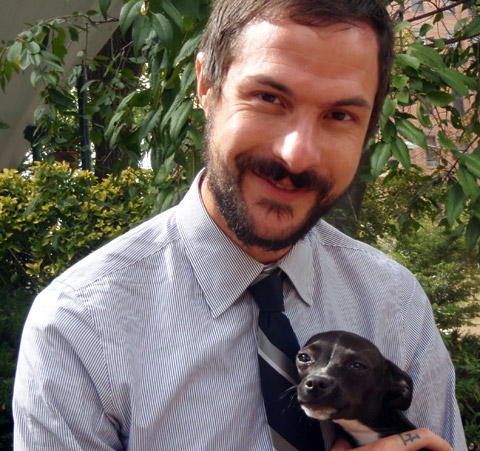The animal-rights organization's case against the labs
By LIZ PELLY | August 4, 2011

“Scientifically, the benefits of experimenting on primates have been consistently overblown by people who make money by doing it.” |
No real apes were used in the making of Rise of the Planet of the Apes — in theatres this Friday — which is only one of the reasons PETA is supporting the film. The radical animal rights organization also favors the film because, according to their Web site, it is the first live-action film ever to be told from the perspective of an animal with "humanlike qualities, who can strategize, organize, and ultimately lead a revolution, and with whom audiences will experience a real emotional bond." What PETA doesn't support are the places where the large majority of Boston's monkey population exist: in research labs, by the thousands. We spoke with Justin Goodman, associate director of PETA's laboratory investigations, about the use of primates for experimentation in schools and labs around Boston, the US, and the world.HAS PETA DONE ANY INVESTIGATING INTO BOSTON'S LABS? In 2009, NASA announced it was giving 1.7 million dollars to an experimenter at Harvard's McLean Hospital to zap three dozen monkeys with radiation and lock them in cages to see how the radiation affects them, destroying their bodies and minds. We launched an aggressive campaign with protests at McLean and every NASA facility around the country. After a year, NASA scrapped plans to fund the project.
HAVE YOU BEEN SUCCESSFUL WITH GETTING IN TOUCH WITH HARVARD OR MIT? I TRIED, NO ONE WOULD TALK TO ME. That's not unique. People who abuse animals for money are usually a little wary about speaking to the public about what they do. One of the reasons they're able to continue doing it is because they're not forced to talk about it. But there's a lot of information available through the government and on the internet because the overwhelming majority of all this experimentation is publicly funded.
HOW DOES THE ANIMAL WELFARE ACT (AWA) TIE IN WITH THIS? The AWA is not an anti-cruelty law. It's a law that creates husbandry standards and record-keeping standards for the use of animals in experiments. No experiment, no matter what species it's on, or how invasive, or how painful, or how trivial, is prohibited by this law. It says you can do anything you want to an animal in a laboratory as long as you fill out the right paperwork.
It says you have to give animals food, water, and veterinary care, and pain relief, and adequate housing. And it also says you can withhold all of those things if you want to for your experiment. Monkey experiments are a good example of this. Very often, to coerce monkeys to participate in an experiment, you have to withhold food and water from them for a day so that they're so hungry and thirsty that they'll do anything for a sip of water or a bite of food. And you're allowed to do that under the law. Or if you're conducting an experiment on pain and you want to see the pain response to putting a monkey's tail on a hot plate, then you don't have to give them pain relief.
 Related
Related:
Photos: PETA Fashion Week protest [vaguely NSFW], The Year in Monkey News, The Big Hurt: Sex Pistols perfume, More 
- Photos: PETA Fashion Week protest [vaguely NSFW]
PETA members protest fur as fashion at Copley Square on September 30, 2010, as a response to Boston Fashion Week.
- The Year in Monkey News
Simian news items, compiled for your reading pleasure.
- The Big Hurt: Sex Pistols perfume
I think I’d be a much happier person if I disabused myself of all my quaint expectations about artistic integrity.
- Transcript: The Phoenix interviews M.I.A.
In September 2004, Diplo still had to explain who M.I.A. was.
- Hollywood's apes: monkey puzzle or intelligent design?
For nearly a century apes have haunted the screen, and the link between man and ape has obsessed filmmakers.
- A monkey, on Chihuly
This monkey likes the Chihuly exhibit.
- How Grass Widow came to play a concert for a small group of great apes
Gigi was in her late 30s the first time she saw a rock band play. The concert took place outside her enclosure, at 8:30 in the morning, so it wouldn't interfere with Franklin Park Zoo's usual visiting hours.
- The 15 most ape-friendly grubs in the hub
Here's a guide to monkey-themed foods available about town.
- Monkey Fancy
Take a peek at an upcoming cover for Monkey Fancy .
- How I learned to stop worrying and love my monkey overlords
Let me be clear: I once loved monkeys.
- Whatever happened to Danville's giant mystery monkey?
The giant monkey of Danville was my symbol, back then, of the fin-de-siècle nadir in media fluffery, thankfully obsolesced in one grim morning.
- Less

 Topics
Topics:
Lifestyle Features
, PETA, Animal Rights, Interviews, More  , PETA, Animal Rights, Interviews, Monkey, Justin Goodman, Less
, PETA, Animal Rights, Interviews, Monkey, Justin Goodman, Less 